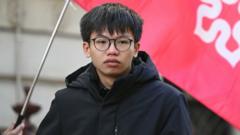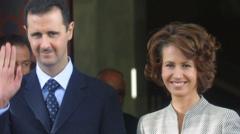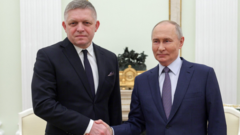In a surprising development, President Aleksandr Lukashenko of Belarus has begun pardoning political prisoners, a move interpreted by many analysts as an effort to ease sanctions from the West. While relations with Russia remain steadfast and supportive, the recent actions could indicate a complex strategy as Belarus navigates its geopolitical standing.
Belarus’ Lukashenko: A Strategic Shift Towards the West Amid Ongoing Controversy

Belarus’ Lukashenko: A Strategic Shift Towards the West Amid Ongoing Controversy
Belarusian President Aleksandr Lukashenko’s recent pardons of political prisoners may signal a cautious overture to Western powers, but analysts remain skeptical of his intentions amidst continued repression.
Amid heightened anticipation for potential cease-fire negotiations in the ongoing conflict between Russia and Ukraine, President Aleksandr G. Lukashenko of Belarus finds himself engaged in a balancing act between his allegiance to Russia and an emerging interest in reconciling with Western powers, according to political analysts.
Lukashenko, often described as an autocrat and a staunch supporter of Russia, has made headlines for his military alignment with Moscow, reportedly hosting Russian nuclear weapons and expressing readiness to accommodate advanced missile systems. However, recent months have seen a notable shift in his political approach, characterized by unexpected pardons of more than 200 individuals who were imprisoned following the nationwide protests against his regime in 2020. This move, documented by Viasna, a human rights organization in exile, raises questions about Lukashenko’s motivations.
The protests, which erupted over allegations of a fraudulent presidential election, have not dissipated entirely, as many leaders of the dissent remain incarcerated. Maria Kolesnikova, an emblem of the opposition, is among them, having gained international attention for her dramatic resistance against deportation. While Lukashenko's pardons have been hailed in pro-government media as a gesture of benevolence, there has been little transparency on whom exactly these actions affect, leading observers to speculate that this could be an attempt at political theater aimed at Western audiences.
The significance of these pardons emerges especially in light of looming sanctions imposed on Belarus as a consequence of its role in supporting Russia's military endeavors in Ukraine. Analysts suggest that the timing of these pardons coincides with rising hopes for diplomatic resolutions regarding the Ukraine conflict, indicating that Lukashenko may be exploring avenues for re-engagement with the West.
While the pardons could potentially affect Belarus’ international relations, skepticism remains regarding Lukashenko's true motives, as many perceive this initiative not as a genuine step towards democratization, but rather a tactical effort to secure political and economic leverage. The reality remains that as long as the core leaders of the 2020 demonstrations face imprisonment, genuine reconciliation and reform in Belarus may seem unlikely, and Lukashenko's overtures could be perceived as half-measures aimed at surviving a turbulent geopolitical landscape.




















